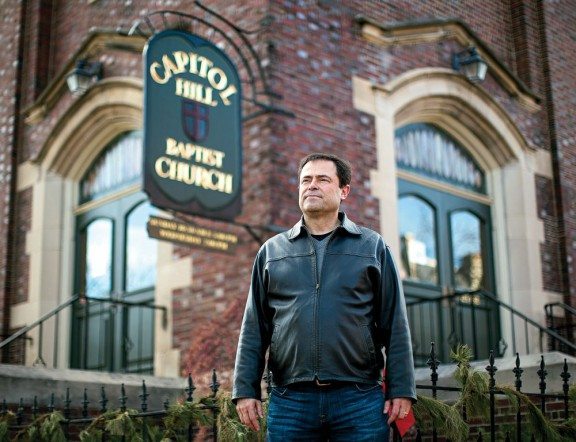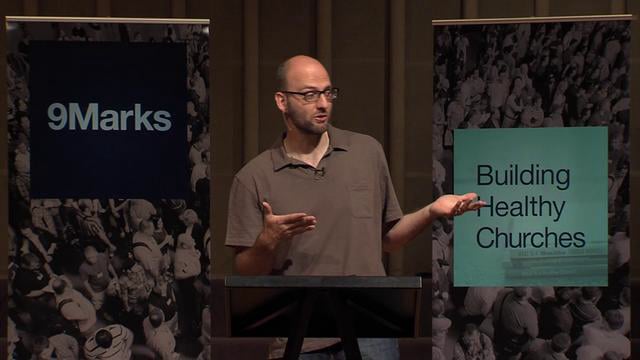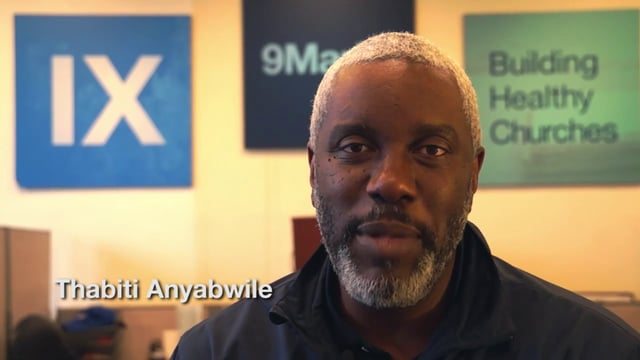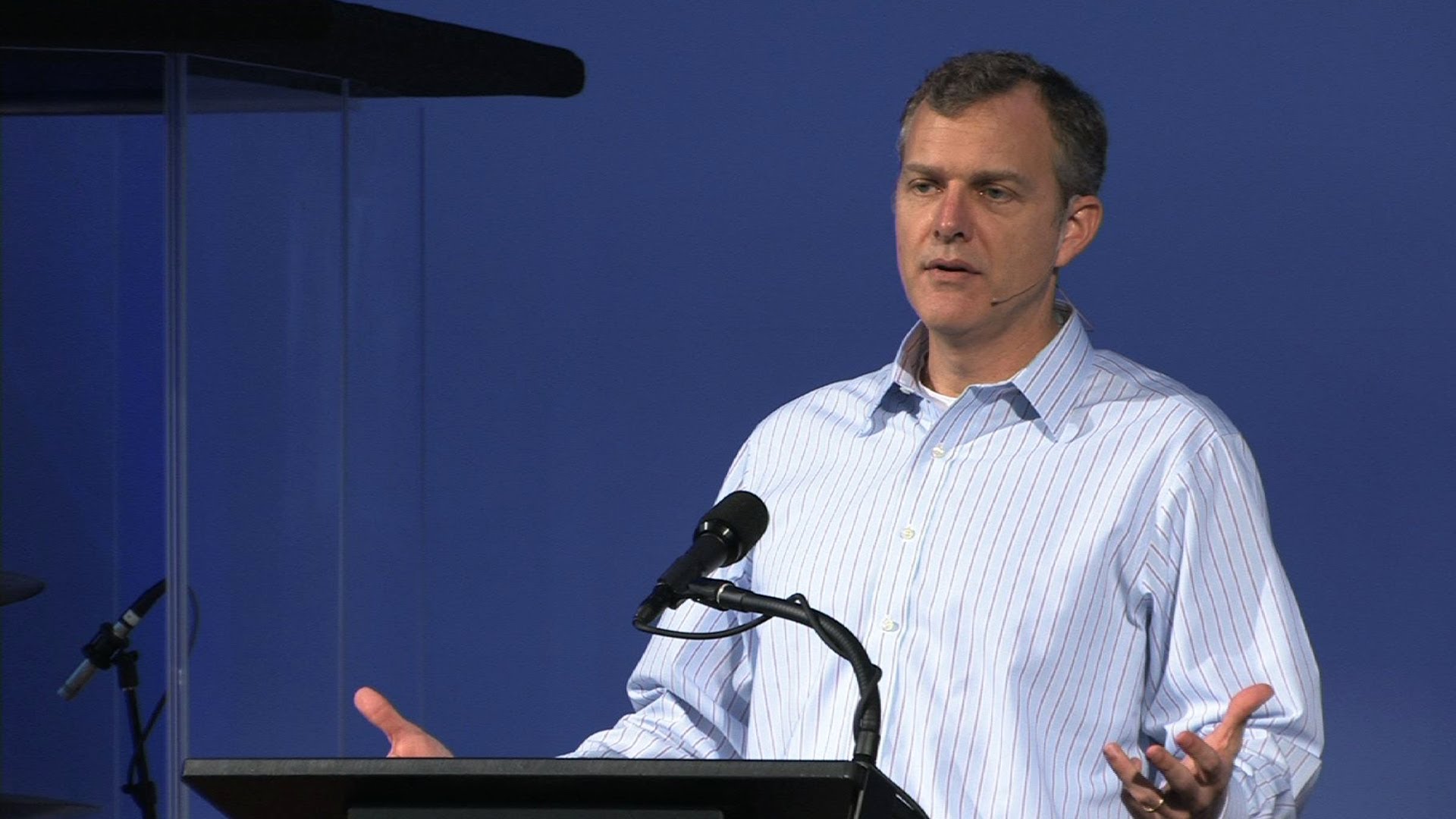
 “I’ve read some of the 9Marks writings and some of these ideas are troublesome to me. I am concerned that while the basic principles may seem to work as a guideline for good and decent shepherds, they also may give license to those pastors who are heavy-handed in authority and ruling over their congregants. We need to be wise in turning to core values in the Bible, not core values of Dever and 9Marks.”
“I’ve read some of the 9Marks writings and some of these ideas are troublesome to me. I am concerned that while the basic principles may seem to work as a guideline for good and decent shepherds, they also may give license to those pastors who are heavy-handed in authority and ruling over their congregants. We need to be wise in turning to core values in the Bible, not core values of Dever and 9Marks.”
–Spiritual Sounding Board
“Patty is a single, middle-aged woman going to a church with a bona fide spiritually abusive pastor. She had difficulty with some of the teachings at church and questioned an elder. The elder told the pastor about it (elders are instructed to tell the pastor of any kind of ‘dissension” among the ranks).
Patty’s church is an independent church. Her church is connected with 9Marks. Her pastor has two elders, but they are yes-men (truth be told, they are afraid of the pastor). They have never questioned him or challenged him on anything they have seen over the many years they have served as elders. They remain silent on any issues of concern.
The pastor has no one over him to hold him accountable. He is spiritually abusive, twists scripture in order to gain more authority over members, and uses his authority in ways that are intrusive in the private lives of church members. Patty decides that she must leave and so she quietly leaves Grace Church and finds Pastor Nate’s church.
Pastor Nate’s church is part of 9Marks and knowing the guidelines set up by 9Marks, he appropriately asks Patty which church she recently left. She tells Nate, “Grace Church, from across town.” Nate knows the pastor of Grace Church. He’s a likable guy. Pastor Nate has run into him at various events in town and knows him by name. He had recently seen him at his son’s soccer game, but they were supporting opposing teams, so they waved to each other as they passed the concession stand.
When Patty tells Pastor Nate that she left Grace Church, Pastor Nate tells her she must go back and tie up loose ends at Grace Church before he will allow her to stay at his church. Patty then reluctantly tells Pastor Nate that her pastor from Grace Church was spiritually abusive. She really had hoped to not bring that subject up.
Pastor Nate doesn’t know Patty, but he’s known the Grace Church pastor casually for 5 years. Surely this could not be. This pastor couldn’t be spiritually abusive. There surely is a misunderstanding.
Who is Pastor Nate going to believe? Patty, whom he doesn’t know from Adam, or the pastor whom Pastor Nate has known casually for 5 years? Most likely Pastor Nate will believe the pastor, after all, both churches are connected and committed to the 9Marks practices, so the Grace Church pastor can’t be that bad, right?
What does Patty do now? Patty is having a hard time trusting anyone in church authority at this point, but she knows the Bible tells her she needs to be meeting regularly. She likes Pastor Nate and his church. It is solid biblically and it feels safe to her. She wants to stay there, but Pastor Nate says she must go back to Grace Church.
Patty thinks to herself that maybe the spiritual abuse was in her head (spiritual abuse victims often justify the abuser’s behavior – similar to a domestic violence victim). She convinces herself that maybe she does need to repent of her sins with the pastor at Grace Church (Patty hasn’t sinned, she’s been spiritually abused. Victims often unknowingly set themselves up to re-victimize themselves.)
She goes back to Grace Church. Now, because the pastor found out that she left his church and went to Pastor Nate’s church, she is put into church discipline for not following the proper membership rules (sanctioned by 9Marks). She is excommunicated and shunned by the church members (the pastor sometimes stretches the rules)- and all of her friends she has had for the last 8 years abandon her. She is completely alone.”
–Spiritual Sounding Board (Note: I suggest you read the article and comments at “Spiritual Sounding Board” -there is some good dialogue with Jonathan Leeman of 9Marks.)
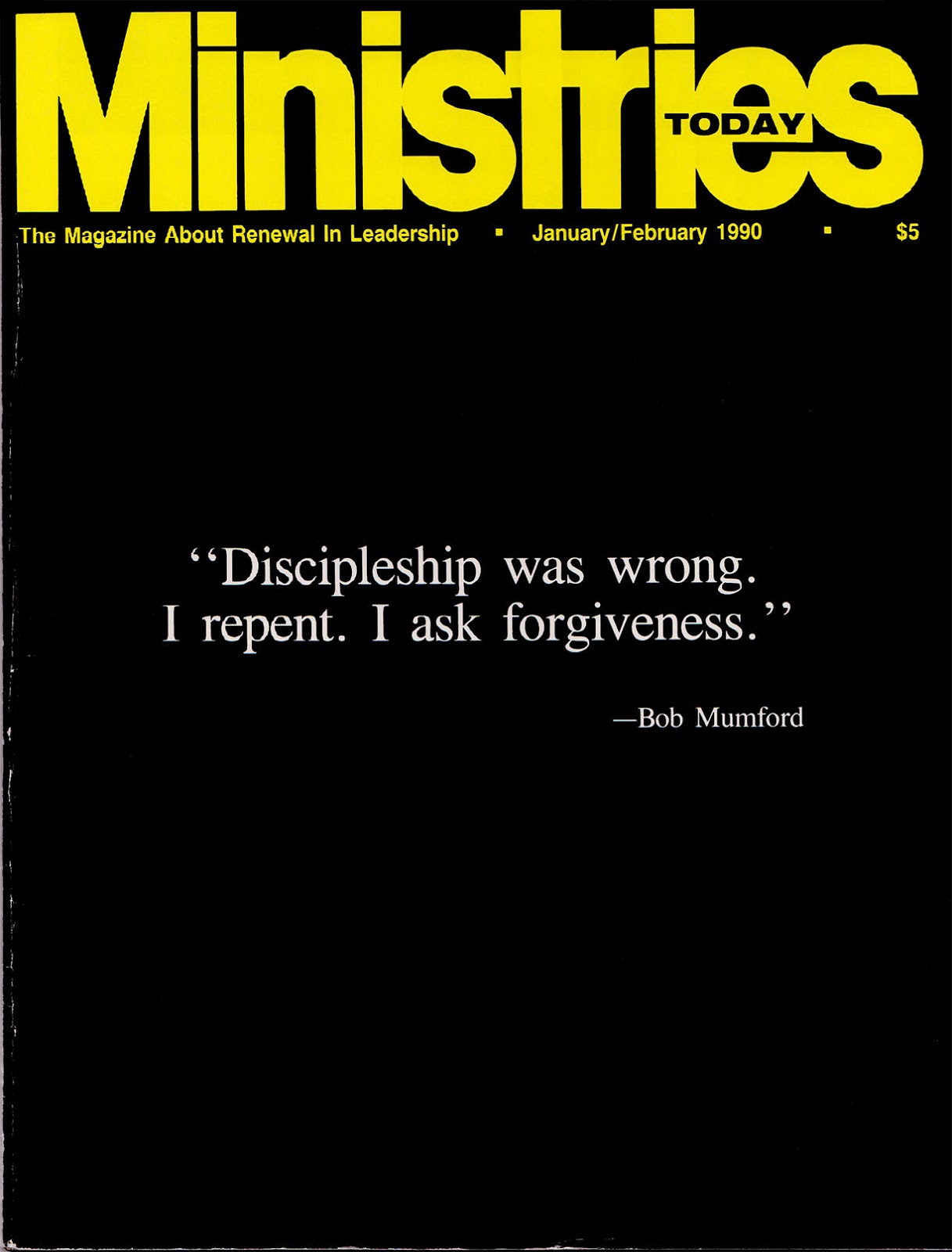
“In the early 1970s, four well-known charismatic leaders responded to a moral failure among charismatics in south Florida. Bob Mumford, Derek Prince, Don Basham, and Charles Simpson felt a need for personal accountability and covenanted together for this purpose, submitting their lives and ministries to one another. Ern Baxter, who had ministered with William Branham, was later added to the group and they became known as the “Ft. Lauderdale Five.” They formed Christian Growth Ministries in 1974, and in the movement that they began, the accountability they shared became an emphasis that all believers should submit to a “shepherd” in order to be discipled in the Christian life. Their prominence helped gain wide acceptance for their teaching, which included what was felt to be correctives to the charismatic movement at the time.
Other charismatic leaders began submitting to the authority of the Ft. Lauderdale Five in what was known as “covenant relationships.” A network of cell groups was formed, with members submitting to a shepherd who in turn was submitted to one of the five or a representative who was submitted to one of the five. At its height, it was estimated that some 100,000 people were involved in this network in the USA. In conjunction with this pyramidal authority structure, the movement taught that every believer needed to be under a “spiritual covering” from a leader in authority over them. Other doctrines taught by the movements included echoes of Latter Rain theology, such as restorationism.
The movement gained a reputation as exhibiting abusive and controlling behaviour through its emphasis on obedience to one’s personal shepherd. In spite of its acceptance among some charismatic leaders, the movement was denounced strongly by others, such as as Pat Robertson and Demos Shakarian. In 1975, a meeting that became known as “the shoot-out at the Curtis Hotel” to place to resolve the dispute, but as implied by the title, the endeavour failed in its objective.
By the mid-1980s, the movement was in sharp decline. Derek Prince severed his ties with the group in 1983, and the movement’s magazine, New Wine, folded in 1986 in the face of ongoing revenue losses. In the late 80s, “Baxter, Basham, and Mumford officially ‘released’ their disciples from their previous pyramidal authority structure.” Prince and Mumford particularly distanced themselves from the movement’s teachings, and in 1990, Bob Mumford went a step further and issued a “Formal Repentance Statement to the Body of Christ,”
-“The Shepherding Movement,” Subversive Influence, February 21, 2008
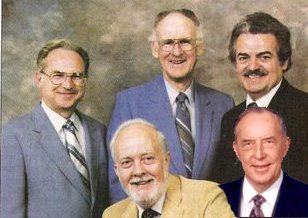
“The Fort Lauderdale Five”
Leaders of the Shepherding Movement
The following is taken from an article titled “The Shepherding Movement Comes of Age” by Lynn and Sarah Leslie. The article can be found here.
“There is a new twist in the old Shepherding Movement and it is coming soon to your church, if it hasn’t already. This new twist is presented to pastors wrapped in silver gilding, and looks quite reasonable and rational. Should a discerning pastor, or one who steeps himself in the Word, take a second look, the gild disappears and in its place will appear rust and corrosion.
Across the country, parishioners are now being challenged to take oaths, perform vows and sign covenants. These things would have been unheard of in generations past for one simple reason. These things used to be forbidden, or only permitted under the gravest of circumstances. A few decades ago churches founded their beliefs sturdily upon the rocks of historical creeds, documents that have withstood the test of time and human whim, and which have imparted to each new generation an understanding of the major tenets of the Gospel faith. Now, in our latter days of dumbed-down Christianity, a minimal number of people in the pews know the creeds, have studied them, or even know about them!
…Oaths and covenants are a new form of legalism entering the church like a flood. They require more of us than Scripture requires. It is a horrible new form of bondage, accomplished in the name of a new church for the 21st century. This is a “transformation” not a “reformation.” It would return the church to the dark ages of oppressive State Church. This movement did not arise from God, but from the rapacious desires of evil men.
…These churches post their covenants on the internet, presumably so that “seekers” will read about their church.
…There is an over-emphasis on “leaders” and “leadership” and “leadership potential.” In many of these churches, leaders are given complete authority over the lives of those in their flocks.
…A list of “Spiritual Commitments” includes a daily prayer life; regular time in God’s Word; active involvement in a small group (usually a cell group); responding obediently to God’s discipline; purposing to discover, develop and use spiritual gifts; living a moral life, maintaining a healthy family life; attending church services; tithing; and supporting the leadership. Most church covenants emphasize the word “all” or “everyone” in their statements such as “Everyone involved in a weekly or ongoing ministry” or “everyone involved in discipleship experience.” No one is excepted.
…Each church covenant includes a section pertaining to resolution of conflict. These examples are noteworthy in their extreme application of Matthew 18,
Membership is described as the “gateway to leadership.” Everyone is presumed a potential leader. Aspiring leaders must make additional commitments, usually called “responsibilities,” which have to do with evangelism, promoting church programs, discipling others, agreeing to be held accountable, and undergoing periodic “continuing education.”
There is a signature line and a date at the bottom of these covenants for people to sign, indicating their commitment to abide by this new church structure. Some churches require that their members sign the covenant yearly. Others only require it upon membership.
…In an ominous revivification of the shepherding movement, ThatChurch!’s bylaws indicate, “Grounds for discipline will be determined by the leadership of the church.”
If you have been caught up in this whole extravaganza, and are marching in this parade, it is time to slow down, stop and reflect. If you have taken an oath to one of these new covenants, you can repent. The Gospel of the Lord Jesus Christ does not require so much of us:
“The Lord do so to me, and more also,” is God’s form of Old Testament oaths – a binding of judgment upon the soul. From this shackle the Lord frees us when He asks us to “Swear not at all.” If free from condemnation, why should we invite the judgment by taking the oath? (S.F. Coffman)
“Come unto me, all ye that labour and are heavy laden, and I will give you rest. Take my yoke upon you, and learn of me; for I am meek and lowly in heart: and ye shall find rest unto your souls. For my yoke is easy, and my burden is light.” (Matthew 11:28-30)
“Now our Lord Jesus Christ himself, and God, even our Father, which hath loved us, and hath given us everlasting consolation and good hope through grace, comfort your hearts, and stablish you in every good word and work.” (2 Thess. 2:16-17)”
-





The 9Marks Five?
Pictured above are Mark Dever, Senior Pastor of Capitol Hill Baptist Church and President of the para-church 9Marks organization; Jonathan Leeman, elder at Capitol Hill Baptist Church and editorial director of 9Marks; Thabiti Anyabwile, former assistant pastor to Mark Dever at CHBC and frequent speaker at 9Marks conferences; Deepak Reju, an assistant pastor at CHBC and frequent contributor to the 9Marks blog site; and John Folmar, Senior pastor of the United Christian Church of Dubai, and former assistant pastor to Mark Dever at CHBC. Folmar has spoken at 9Marks conferences and written articles for their blog site.
I suppose all organizations have some good and some bad elements in them. The Shepherding movement seemed to start out well, but they spun out of control as the leaders became increasingly power hungry. The leaders ended up attempting to control the lives of those under them by insisting everyone have someone they are accountable to and demanding submission to the leaders. Unfortunately, I see signs 9Marks is going down the same road. They have some good principles, but it seems they are trending towards the same types of things that negatively affected the Shepherding movement. They continually stress the need for formal church membership, membership contracts, accountability, and submission to leaders who appear all too ready to implement heavy-handed discipline to their underlings, while excusing their fellow leaders for much more grievous actions. Unfortunately, many people are damaged and some even walk away from the Christian faith because of heartless control freaks in leadership positions.
Check out these screenshots of a few typical articles from the 9Marks website, authored by Deepak Reju and Jonathan Leeman. The articles have now been removed from their blog, probably because the public took 9Marks leaders to task for their embarrassing display of the 9Marks desire to control church members. The articles can still be found, thanks to the wonders of technology, on the “Way Back Machine.”
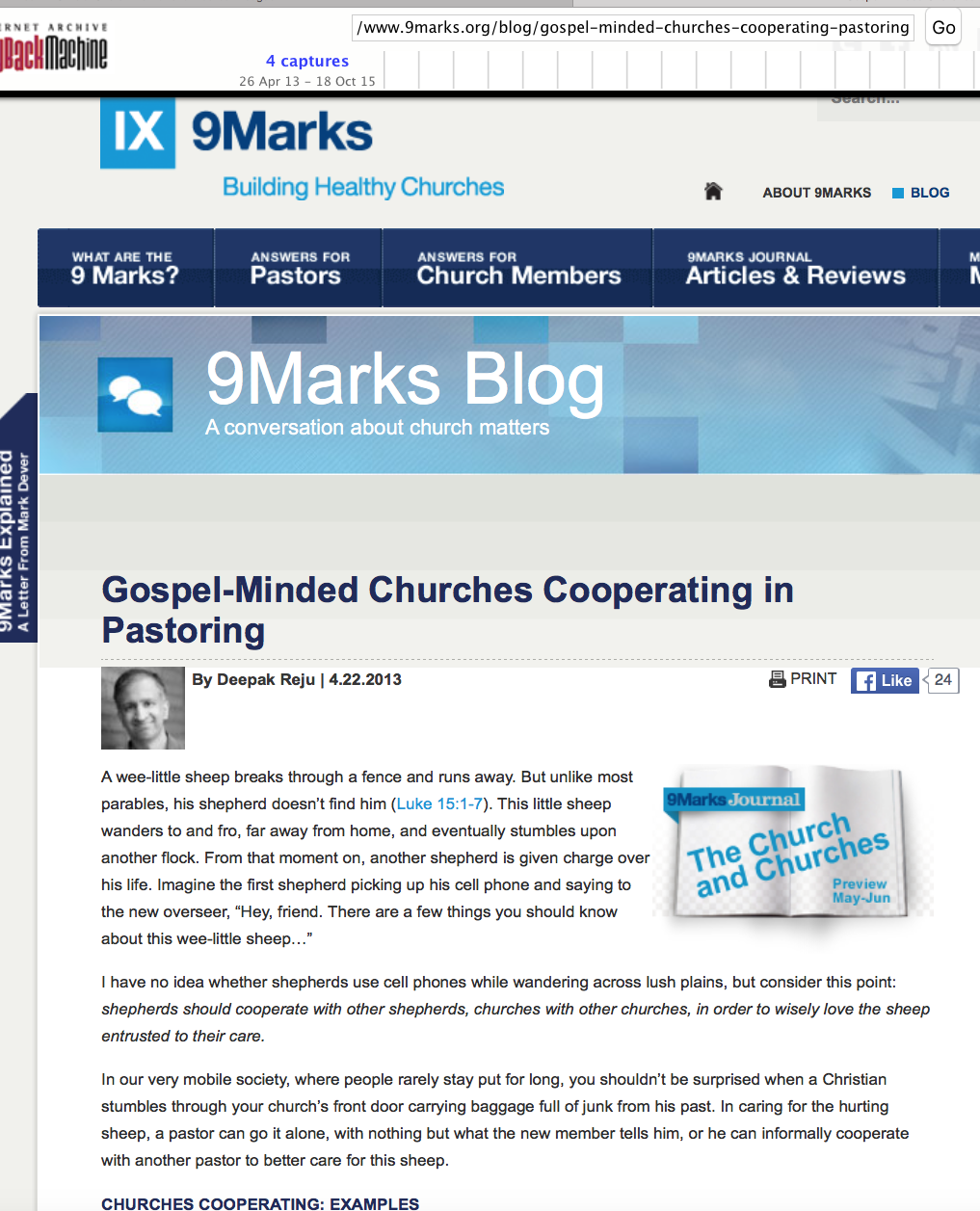

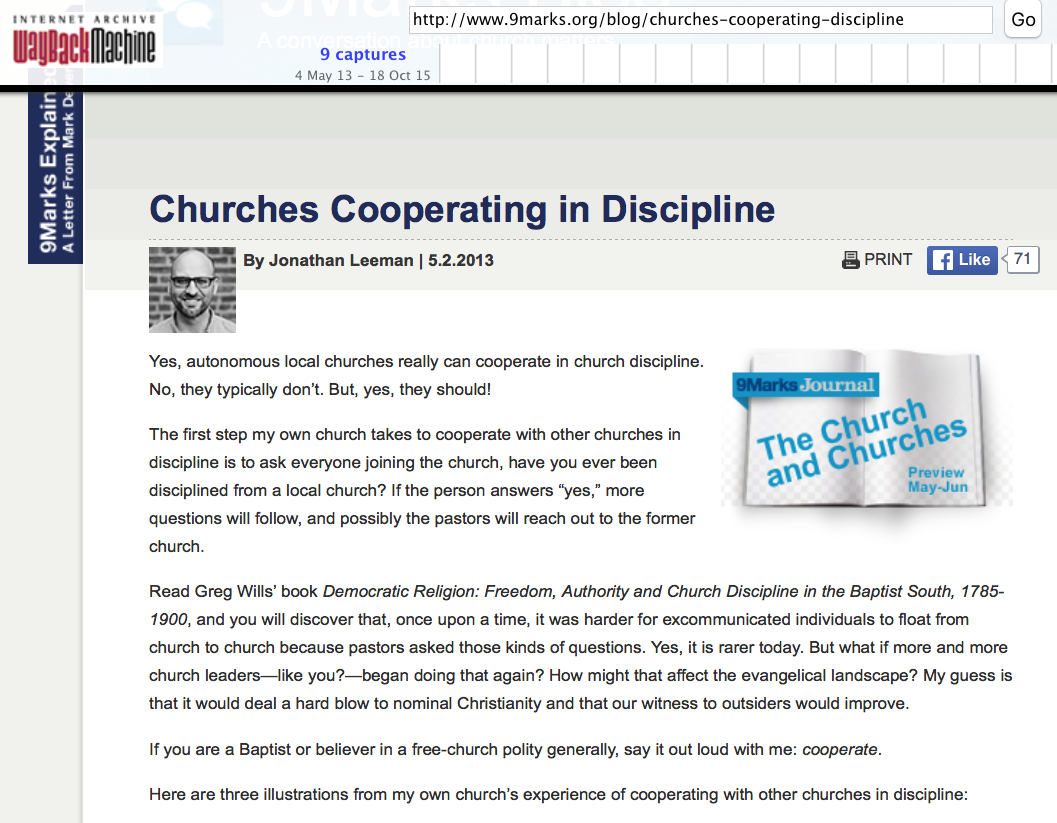
Below are clips from five sermons preached by John Folmar where he speaks about “accountability”. I took these sermons from a wide time frame, they were not hard to locate as Folmar speaks about church membership and accountability in almost every sermon. (I think maybe that is the Gospel.) I imagine if your church is on the 9Marks list of approved churches you probably hear the same things.
Further evidence of what I am talking about is found in this article from “The Wartburg Watch:”
“The Christian Post published an article earlier this week recapping an evangelical conference driving home the point that churches need to establish a culture of accountability. The article begins as follows:
“Pastors Mark Dever of Capitol Hill Baptist Church in Washington, D.C. and Christopher Brooks, head of Evangel Ministries in Detroit, say congregations must uphold their biblical responsibilities as members of the church by creating a “culture of accountability” for their pastors and church leaders.
Speaking at the Evangelical Leadership Summit hosted by the American Enterprise Institute, the two pastors who oversee inner city churches talked about an array of issues concerning pastoral leadership.
“I think a lot of churches are dysfunctional because their pastors are terrible. And I would like to see more healthy pastors leading more healthy churches,” Dever said.”
By making the above statement, we can only assume that Dever believes the terrible pastors are outside of the 9Marks umbrella. After all, years ago he self-published a book entitled The Nine Marks of a Healthy Church, which has subsequently been published by Crossway. It is noteworthy that Joshua Harris wrote the Foreward, and C.J. Mahaney endorsed it with these words:
“This is the best book I have read on this topic of critical importance.””
The audio clip below is from a sermon preached by John Folmar, Senior pastor of the United Christian Church of Dubai, (UCCD) on January 2, 2015. The sermon is titled “Fight the Good Fight” and was based on 1 Timothy 6:11-16. The audio may be found here.
The audio clip below is from a sermon preached by John Folmar, Senior pastor of the United Christian Church of Dubai, (UCCD) on September 12, 2014. The sermon is titled “Hold on to Faith” and was based on 1 Timothy 1:12-20. The audio may be found here.
The audio clip below is from a sermon preached by John Folmar, Senior pastor of the United Christian Church of Dubai, (UCCD) on October 11, 2013. The sermon is titled “A Mixed Church” and was based on Revelation 2:12-17. The audio may be found here.
The audio clip below is from a sermon preached by John Folmar, Senior pastor of the United Christian Church of Dubai, (UCCD) on March 8, 2013. The sermon is titled “Looking Ahead” and was based on Numbers 22:1-24:45. The audio may be found here.
The audio clip below is from a sermon preached by John Folmar, Senior pastor of the United Christian Church of Dubai, (UCCD) on April 27, 2014. The sermon is titled “The Prostitute” and was based on Revelation 17:1-18. The audio may be found here.
It should be fairly obvious that John Folmar thinks “accountability” is critical for a successful Christian journey. Wayne Jacobsen offers a contrary opinion in the audio clip below. I find his view refreshingly honest and I agree with what he says. The clip is from a Vimeo video titled: “Learning to Live Loved: An Interview with Wayne Jacobsen,” part 2. The complete video may be viewed below or you can just listen to relevant audio section. Christianity needs to hear more from guys like Wayne Jacobsen and less from the 9Marks men.
Miss You – Stefan Van Voorst
The Mystery of Faith – Glenn Packiam
For further information:
9Marks and “Biblical” Church Membership?
9Marks: Church Authority over Church Members
Keeping Tabs on Church Quitters
